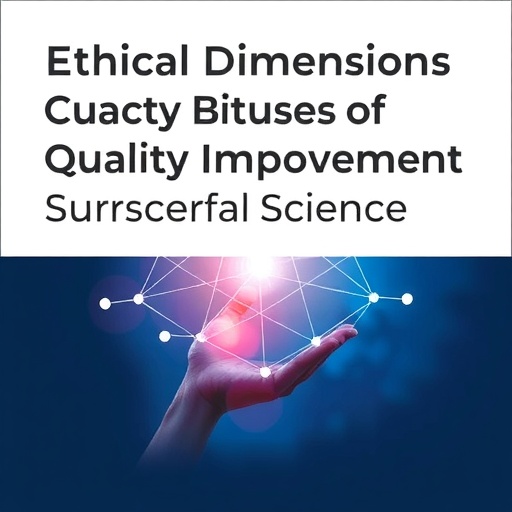In the intricate landscape of healthcare, clinicians bear not only the responsibility of delivering effective treatment but also an ethical duty to continuously improve the quality of care while simultaneously protecting patients from harm. This dual imperative underpins the burgeoning field of Quality Improvement (QI) within clinical environments, particularly in sensitive domains such as neonatal and perinatal care. Unlike traditional human subjects’ research—where ethical parameters are well demarcated by regulatory bodies—QI initiatives inhabit a more ambiguous ethical terrain. Understanding this nuance is crucial as neonatal populations represent one of the most vulnerable groups in medicine, demanding that improvement projects transcend clinical objectives to embrace rigorous ethical scrutiny.
Quality Improvement, by its nature, seeks to implement systematic changes aimed at enhancing patient outcomes and healthcare processes. However, the ethical complexities of QI become apparent when these initiatives intersect with patient autonomy, justice, beneficence, and non-maleficence. The conventional frameworks that govern clinical trials—such as informed consent protocols, strict oversight, and accountability measures—may not seamlessly apply to QI efforts, which often involve iterative interventions integrated directly into clinical practice. This integration blurs the line between clinical care and research, creating unique challenges in delineating ethical boundaries.
Neonatal and perinatal care are fields where these challenges are particularly pronounced. Neonates, by virtue of their dependency and vulnerability, cannot advocate for themselves, and their healthcare decisions are mediated entirely by clinicians and guardians. This dynamic imposes additional ethical layers on QI projects. Ethical considerations must prioritize minimizing risks to these infants while promoting interventions that can lead to measurable improvements in survival rates and developmental outcomes. At the same time, respecting parental autonomy while navigating the inherent uncertainties in emergent QI protocols adds layers of complexity for providers.
One of the cardinal ethical principles applicable to neonatal QI is beneficence—the obligation to act in the patient’s best interest. In QI initiatives, this principle extends beyond immediate clinical care to include a broader system-level approach aimed at optimizing standards of care across diverse patient populations. Non-maleficence, the requirement to “do no harm,” poses stringent challenges when implementing new protocols whose long-term impacts may be uncertain. It compels QI teams to design projects that are not only evidence-informed but also rigorously monitored to identify and mitigate unforeseen adverse effects.
Justice, another foundational ethical tenet, demands equitable distribution of healthcare benefits and burdens. In neonatal QI, this means ensuring that improvements are accessible across socioeconomic and demographic boundaries, mitigating disparities that often disproportionately affect marginalized groups. QI initiatives must vigilantly avoid introducing biases or systemic inequalities, an area warranting meticulous attention given the historical underrepresentation of certain populations in clinical enhancements.
Respect for autonomy further complicates the ethical landscape in neonatal settings. Given that neonates lack decision-making capacity, parental consent plays a pivotal role. However, parents often face emotional and informational overload during the perinatal period, complicating fully informed decision-making about participation in QI projects. Thus, transparent communication strategies and context-sensitive consent processes become indispensable components of ethically sound QI design.
Transparency is a recurring theme—both in the ethical discourse and practical implementation of QI activities. Ethical transparency encompasses candid reporting of project goals, potential benefits, risks, and limitations to all stakeholders, including families and the broader clinical team. Similarly, methodological transparency enhances the reproducibility and credibility of QI work, fostering trust and facilitating broader adoption of proven interventions.
Rigorous study designs adapted to QI contexts are essential to ethically sound initiatives. Unlike randomized controlled trials, many QI projects rely on real-time adjustments and adaptive methodologies reflecting the dynamic nature of clinical environments. Ethical oversight for such designs may require novel frameworks balancing flexibility with obligation to protect patients. Institutional review boards and ethical committees may need to evolve alongside QI methodologies to provide tailored guidance that respects the national regulatory landscape while encouraging innovation.
Dissemination of QI findings carries its own ethical weight. Sharing results—both positive and negative—is imperative to prevent repetition of ineffective or harmful interventions and to contribute collectively to the advancement of neonatal care. Ethical dissemination involves duly acknowledging limitations, avoiding overstatement of benefits, and contextualizing results within the specific environments in which projects were conducted. This balanced approach enhances the external validity and applicability of QI outcomes across diverse neonatal care settings.
Ultimately, the ethical framework surrounding neonatal and perinatal QI initiatives must be comprehensive, dynamic, and patient-centered. Clinicians and researchers must engage in continuous ethical reflection, anticipating challenges inherent in balancing improvement goals with patient protection. Interdisciplinary collaboration involving ethicists, clinicians, families, and QI experts can facilitate development of guidelines and best practices that uphold ethical integrity without stifling innovation.
The significance of ethical rigor in QI transcends neonatal care. As healthcare systems increasingly integrate data-driven, iterative improvement strategies, the principles outlined here serve as a blueprint for ethically navigating this transition. Success in neonatal QI ethical integration could inspire similar approaches in other sensitive populations, such as geriatrics or oncology, where vulnerability and complexity coexist.
In conclusion, the evolving discourse around ethical considerations in neonatal Quality Improvement is reshaping the norms of clinical care. By embedding core ethical principles—beneficence, non-maleficence, justice, and respect for autonomy—into the fabric of QI projects, healthcare providers can ensure that their efforts not only enhance patient outcomes but also uphold the dignity and safety of the most fragile patients. This balanced approach promises sustained trust from families and clinicians alike, while positioning neonatal QI at the forefront of ethical clinical innovation.
Subject of Research:
Article Title:
Article References:
Pearlman, S.A., Murray, P.D. & Bapat, R. Ethical considerations in quality improvement.
J Perinatol (2025). https://doi.org/10.1038/s41372-025-02403-0
Image Credits: AI Generated
DOI: https://doi.org/10.1038/s41372-025-02403-0
Keywords:
Tags: balancing clinical objectives with ethicsbeneficence and non-maleficence in QIcontinuous improvement in patient careethical challenges in quality improvementethical frameworks for quality improvementethical scrutiny in healthcare initiativesintegration of QI in clinical practicejustice in healthcare practicesneonatal care ethical considerationspatient autonomy in healthcareperinatal care quality improvementvulnerable populations in healthcare





